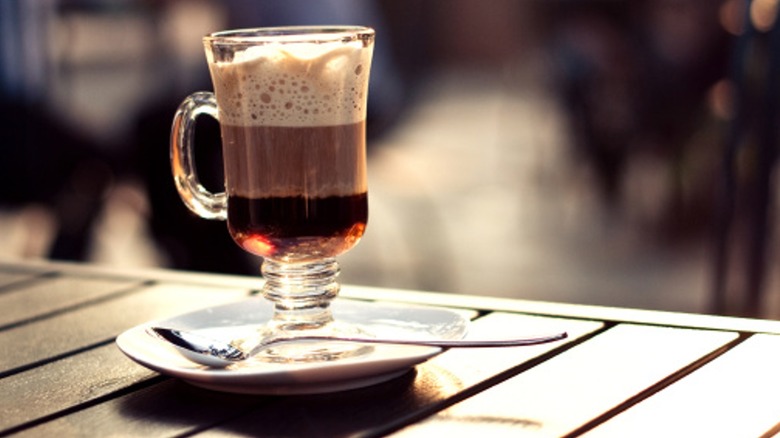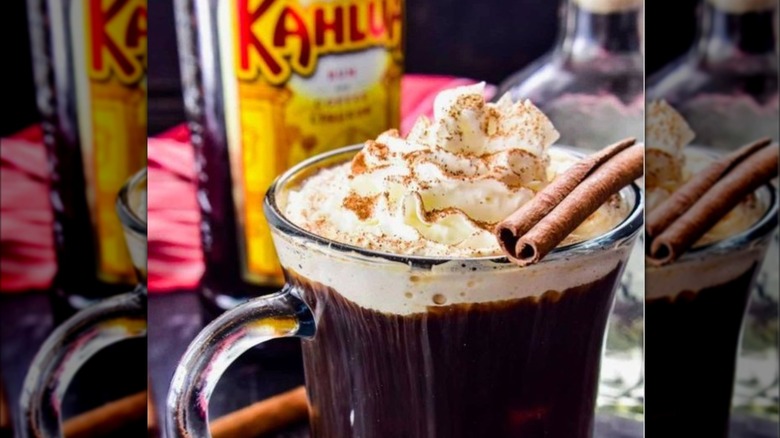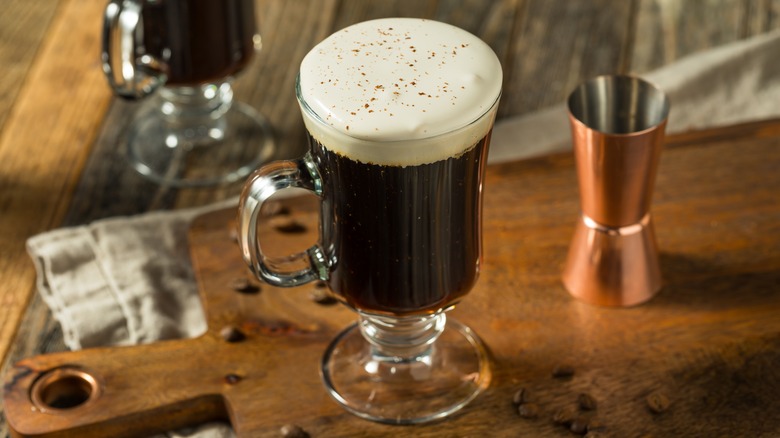Mexican Vs Irish Coffee: The Difference Between The Cocktails
While it might be easy to assume that an order of coffee is pretty similar from one country to the next, coffee can be served quite differently depending on where you are in the world. From brewing methods to various ingredients added to your mug, a cup of Joe isn't always a simple brew of caffeinated goodness. And sometimes, you want your coffee experience to meld with that of sipping a cocktail. We are here to help explain the differences between Irish coffee and Mexican coffee so that you know exactly what to order when you are craving a boozier brew.
Of course, coffee can always be customized to your liking. But having a basic understanding of classic orders can serve you well as you stir up recipes for yourself at home or ask your friendly local barista (or bartender) for special adjustments. Though Irish and Mexican coffees may differ when it comes to the specific liquors and other ingredients used to make each cocktail, you can still bank on a warm, spiked, creamy, and caffeinated concoction being delivered to your hands once the beverage is put together, regardless of which order you decide to place.
What is a Mexican coffee cocktail?
Mexican coffee, commonly known as café de olla, is traditionally made in clay pots. Earthenware known as an olla is filled with cinnamon and cloves that have been roasted, and for added sweetness, chocolate and sweeteners like molasses, brown sugar, or an unrefined sugar known as piloncillo can be added to the coffee. Though this spiced coffee was first served at events like funerals and Day of the Dead celebrations, Mexican coffee can now be found on menus worldwide.
The drink also has rumored origins dating back to the Mexican Revolution when large clay pots were used to brew enough coffee to fuel soldiers, and sugar and spices helped keep those on the battlefield energized. When mixed with piloncillo sugar, freshly ground coffee beans blend smoothly, and subtle caramel notes found in the coffee come to life. Mexican coffee cocktails take this recipe a step further by introducing a splash of Kahlúa and tequila into the mix and crowning the drink with whipped cream.
Packing two kinds of booze renders this coffee order a drink intended for more mature palates, and while the finished glass doesn't necessarily offer spices as part of the ingredient list, you can top the drink with a sprinkle of warming cinnamon and add some cinnamon sticks to create the effect. You can also use traditional Mexican café de olla as the drink's base to create a more nuanced (and authentic) spiced flavor. Given the presence of peppery tequila, the cocktail is sure to pack a flavorful wallop regardless.
What is an Irish coffee?
For coffee lovers who decidedly want alcohol in their drink, an Irish coffee may be the perfect order. Irish coffee was first poured in Ireland in 1943 for a group of disheartened travelers and quickly made waves around the world. Lacking the spices found in the aforementioned Mexican coffee cocktail, Irish coffees offer Irish whiskey, coffee, and brown sugar mixed together and served with a frothy layer of cream.
The presented drink may look straightforward, but mastering the recipe to make Irish coffee can be tricky. Not only must the cocktail be served in a clear glass with a handle since the drink is warm, but the pretty layers of boozy coffee and rich cream must be visible through whatever mug you decide to serve your concoction in. The type of whiskey used to make the drink can also change the name of the recipe.
For instance, when made with Scotch, the drink is called a Scottish coffee or Highland coffee, but when bourbon is used to make it, it is referred to as a Kentucky coffee. Whipped cream is key in making perfect Irish coffee, plus strong coffee, a pre-heated glass, and a final dusting of nutmeg to crown the creation. While some bartenders may put their own twists on the drink by infusing whiskey with ground espresso or adding coffee or Baileys Irish cream liqueur to the recipe, sometimes a solid, reliable classic is all you need in your at-home bartending arsenal.


